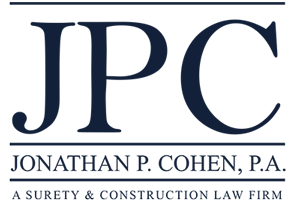The information provided in this article does not, and is not intended to, constitute legal advice.
The content in this article is available for general informational purposes only.
Help from a Florida Lien Attorney
Florida’s construction lien law provisions provide a way for architects, contractors, suppliers, and subcontractors to place liens against real property so that they can recoup what they are owed when they are not paid for their services, labor, or materials. Before people and corporations can seek legal remedies under these laws, however, they must first meet the eligibility requirements. When applying the construction lien laws in the field, parties might encounter some complex situations. Florida construction lawyer Jonathan P. Cohen, Esq. can analyze issues that might arise to help his clients protect their interests. Below are a couple of special problems that might be encountered by architects when pursuing construction liens against real property and answers about how the law addresses each one.
Problem: An owner hires an architect to design a home but never builds it. The owner fails to pay the architect, and the architect files a construction lien against the property. Can the architect do that?
Answer: Architects are allowed to perfect construction liens against property even when the property is not improved under Cabarrocas v. Resolution Trust Corp., 840 F. Supp. 888, 891 (S.D. Fla. 1993). In that case, a man who had a contract with New Metropolitan Federal Savings and Loan Association to purchase a property called the Hidden Bay/Key Largo Yacht Club hired an architect to perform architectural services for the property. The bank owned the property, and the architectural services were performed while it still owned the property. New Metropolitan subsequently failed, and the Resolution Trust Corporation assumed ownership of the yacht club as the receiver of the failed bank.
The sale to the man who hired the architect fell through when New Metropolitan failed, and the Resolution Trust Corporation did not make any improvements to the property. RTC failed to pay the architect for his services, but it did advertise the property as including the building permit that the architect had helped to secure with his work. The architect liened the yacht club to secure payment for his services and sought to foreclose on the lien.
The Resolution Trust Corporation filed a motion for summary judgment, arguing that the architect could not place a construction lien against the property since no improvements were made, and the architect did not have a contract with RTC, the owner. It argued that under Fla. Stat. § 713.03(1), architects can only lien property when improvements are made. RTC also argued that it had taken ownership of the yacht club free of any claims against New Metropolitan and that any agreements with New Metropolitan could only be enforced against RTC if they were in writing under 12 U.S.C. § 1823(e).
The court found that while there was no written contract, that did not mean that an oral contract between the architect and the man to perform architectural services did not exist. The architect also argued that the man was acting as an agent of New Metropolitan at the time he entered into an oral contract with the architect for the architect to perform services and that the architect had performed the contracted services. The court found that if the plaintiff could present sufficient evidence showing that the man was acting as the agent of New Metropolitan, the court or jury could then find that a contract existed between the architect and New Metropolitan. It also found that 12 U.S.C. § 1823(e) was inapplicable to the situation. Since material issues of fact remained, the court denied the motion for summary judgment.
While an architect can lien property when a home that he or she designs is not built, it will depend on whether the architect was hired by a general contractor. If a general contractor hired the architect, the architect will have to show that the property was improved since the architect was not in privity with the property’s owner. In other words, if the owner hires the architect (known as being in privity with the owner), then the property need not be improved for the architect to be able to lien.
Problem: An owner hires an unlicensed architect to design a home but never builds it. The owner then fails to pay the architect, and the architect liens the property. Can the architect do that?
Answer: Unlicensed or unregistered architects may not lien property under Alfred Karram, III, Inc. v. Canter, 634 So.2d 210 (Fla. 4th DCA 1994). In that case, the property owner contracted with a corporation for architectural services to design a single-family home but never built it. The corporation did not have a certificate of authorization under Fla. Stat. § 481.219 because none of its officers were licensed architects. The owner did not pay for the architectural services, and the corporation liened the property and sought to foreclose on the lien.
The court found that the corporation did not have a right to lien the property since only licensed architects or contractors are allowed to lien property under Fla. Stat. § 713.03(2), and an architect is defined in § 481.219 as only including those who are licensed. In that case, the defendant-owner filed a motion for summary judgment. The court granted the motion in part and reversed and remanded the case for further proceedings on the corporation’s contract claims. While the court found that an unlicensed architect was not permitted to lien property, it did find that the corporation could still pursue its contract claims.
Homeowners who have liens placed against their unimproved property by unlicensed architects can file slander of title claims. However, if the owners actually make the called-for improvements, the architect might not have to be licensed to lien the property.
Get help from a Florida lien attorney at Jonathan P. Cohen, P.A.
Florida construction lawyer Jonathan P. Cohen, Esq. regularly handles complex issues for his clients under the state’s lien laws. If you are dealing with issues similar to the ones described above, you should contact a Florida lien attorney at Jonathan P. Cohen, P.A. by calling (954) 462-8850 for advice about the legal remedies that might be available to you.

